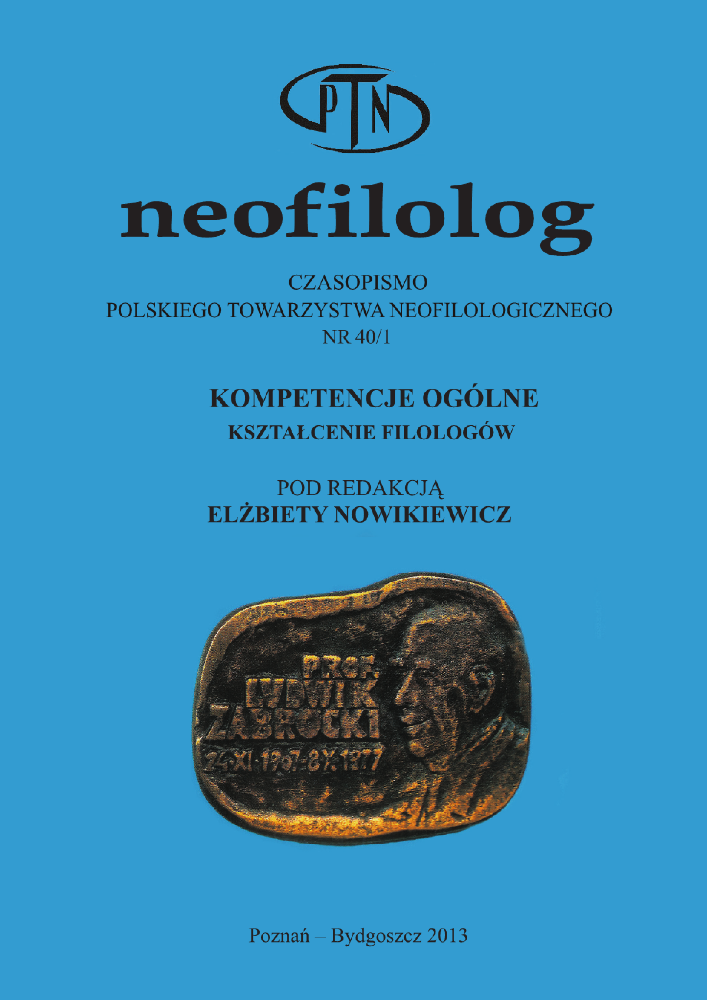Abstract
The following article refers to the benefits and possible uses of English in the process of learning German. The author presents and explores the results of an inquiry conducted among students of Applied Linguis-tics at the Kazimierz Wielki University in Bydgoszcz who learn English as L1 and German as L2, which demonstrates their effective language learning strategies. The study shows conclusions drawn from the students’ answers and with examples shows that English can be a source for positive transfer to German.References
Arabski, J. 1997. Przyswajanie języka obcego i pamięć werbalna. Katowice: Wydawnictwo „Śląsk”.
Bawej, I. 2011. « Język polski jako czynnik ułatwiający naukę języka niemieckiego ». (w) Nauczanie języka obcego a specyficzne potrzeby uczących się. O kompetencjach, motywowaniu i strategiach (red. Knieja, S. Piotrowski). Lublin: Towarzystwo Naukowe KUL: 93-105.
Cichoń, M. 2011. « Zdolny uczeń – autonomiczny uczeń: jak rozwijać skuteczne strategie uczenia się na lekcji języka obcego ». (w) Neofilolog. 36: 293-302.
Decke-Cornill, H. i Küster, L. 2010. Fremdsprachendidaktik. Eine Einführung. Tübingen: Narr Verlag.
Hufeisen, B. 1999. « Deutsch als zweite Fremdsprache ». (w) Fremdsprache Deutsch 1: 4-6.
Komorowska, H. 1980. Nauczanie gramatyki języka obcego a interferencja. Warszawa: WSiP.
Latkowska, J.1996. « Rola i miejsce języka ojczystego w procesie nauczania języka obcego. Część II ». Języki Obce w Szkole 4: 300-306.
Mrozowska, H. 1999. « Świadomość językowa w nauczaniu języka obcego ». (w) Języki Obce w Szkole 1: 4-10.
Pawlak, M. 2009. « Metodologia badań nad strategiami uczenia się języka obcego ». (w) Neofilolog 32: 65-83.
Pfeiffer, W. 2011. Nauka języków obcych. Od praktyki do praktyki. Poznań: Wagros.
Rampillon, U. 1985. Lerntechniken im Fremdsprachenunterricht. Ismaning: Max Hueber Verlag.
Selinker, L. 1972. « Interlanguage ». IRAL 10: 209-230.
Sobolew, L. 1987. « Strategie uczenia się języka obcego ». (w) Języki Obce w Szkole. 397-403.
Strasser, M. 2008. Verständigungsstrategien bei sehr geringen Sprachkenntnissen. Eine explorative Studie zur Kommunikation unter Bedingungen der Interkomprehension. Wien: Praesens Verlag.
Szarska-Wieruszewska, J. 2004. Lernstrategien als Grundlage der lerntypischen Fehlerbehandlungen. Forschungsstudien am Beispiel der Deutsch lernenden, polnischen Studenten. Hamburg: Verlag Dr. Kovać.
Tobiasz, L. 2009. « Język angielski w procesie uczenia się języka niemieckiego – pomoc czy przeszkoda? Krytyczna analiza ankiet przeprowadzonych wśród studentów anglistyki Uniwersytetu Śląskiego w grupach tłumaczeniowych z językiem niemieckim ». (w) Neofilolog 33: 257-268.
Wendt, M. 1993. Strategien des fremdsprachlichen Handelns. Tübingen: Gunter Narr Verlag.
Wiese, H. 1994. « Integration des Transfers in eine Theorie des Zweitspracherwerbs ». (w) Info DaF 21. 4: 397-408.
Wille, L. i Wawrzyniak, Z. 2005. Język angielski kluczem do języka niemieckiego. Język niemiecki kluczem do języka angielskiego. Gramatyka konfrontatywna niemiecko-angielska w ćwiczeniach. Zielona Góra: Kanion.
License
Copyright (c) 2019 Neofilolog

This work is licensed under a Creative Commons Attribution-NoDerivatives 4.0 International License.
Authors
Authors of texts accepted for publication in Neofilolog are required to complete, sign and return to the Editorial team’s office the Agreement for granting a royalty-free license to works with a commitment to grant a CC sub-license.
Under the agreement, the authors of the texts published in Neofilolog grant Adam Mickiewicz University in Poznań a non-exclusive, royalty-free license and authorize the use of Attribution-NoDerivatives 4.0 International (CC BY-ND 4.0) Creative Commons sub-license.
The authors retain the right to the free disposal of the work.
Users
Interested Internet users are entitled to use works that have been published in Neofilolog since 2017, under the following conditions:
▪ attribution – obligation to provide, together with the distributed work, information about the authorship, title, source (link to the original work, DOI) and the license itself.
▪ no derivatives – the work must be preserved in its original form. Without the author's consent, it is not possible to distribute the modified work in the form of translations, publications, etc.
Copyrights are reserved for all texts published since 2017.
Miscellaneous
Adam Mickiewicz University in Poznań retains the property right as a whole (layout, graphic form, title, cover design, logo etc.).
